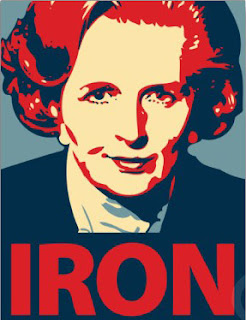
David Cameron said she had been a "great Briton" while US President Barack Obama called her a "great champion of freedom and liberty".
The funeral of the former prime minister is expected to be held next week.
The ceremony, with full military honours, will take place at London's St Paul's Cathedral.
Lady Thatcher, Britain's first female premier, was Conservative prime minister from 1979 to 1990 and won three successive general elections.
She died "peacefully" after suffering a stroke while staying at the Ritz hotel in central London.
She will not have a state funeral but will be accorded the same status as Princess Diana and the Queen Mother.
The union jack above Number 10 Downing Street has been lowered to half-mast while Parliament will be recalled from its Easter recess on Wednesday to enable MPs to pay tributes.
Obama tribute

While acknowledging that she had "divided opinion", Mr Cameron said she had "taken a country that was on its knees and made it stand tall again.
"Margaret Thatcher loved this country and served it with all she had," he said. "For that she has her well-earned place in history - and the enduring respect and gratitude of the British people."
Her other successors in No 10 - Sir John Major, Tony Blair and Gordon Brown - paid tribute to her strength of character and political purpose while Labour leader Ed Miliband said Lady Thatcher had been a "unique figure" who "reshaped the politics of a whole generation"
But critics questioned the economic and social impact of her policies, ex-Labour leader Lord Kinnock saying her economic policies had been an "unmitigated disaster for Britain" at the time.
Among international reaction, US President Barack Obama said "America has lost a true friend", while German Chancellor Angela Merkel said she would "never forget her part in surmounting the division of Europe and at the end of the Cold War".
BBC political editor Nick Robinson said Lady Thatcher - who had suffered poor health for several years - would always be a divisive politician but one who inspired "passion" among her critics and supporters.
Her government privatised state-owned industries and was involved in a stand-off with unions during the Miners' Strike of 1984-5.
She was in power when the UK fought a war following Argentina's invasion of the Falkland Islands in 1982 but during her later years in office became associated with Euroscepticism and was increasingly at odds with other senior figures in the Conservative Party.
'Unique'

But opponents attacked Lady Thatcher's economic legacy and political style.
Lord Kinnock said the "poor had got poorer for the first time in a century" under her rule while Sinn Fein president Gerry Adams said she had "prolonged the war and caused great suffering" in Northern Ireland by the use of "draconian, militaristic policies".
In a statement, The National Union of Mineworkers said Lady Thatcher had "set out to serve those whose interests were profit for the few" and this had led to the "decimation" of the coal industry.
Lady Thatcher had been staying at the Ritz hotel since being discharged from hospital at the end of last year.
Born Margaret Roberts, the daughter of a shopkeeper and Conservative councillor in Grantham, Lincolnshire, in 1925, she first became an MP in 1959.
Having been education secretary, she successfully challenged former PM Edward Heath for her party's leadership in 1975 and won general elections in 1979, 1983 and 1987.
She stood down in 1990 after she failed to beat Michael Heseltine by enough votes to prevent his leadership challenge going into a second round.
LIFE OF MARGARET THATCHER

1951 - Married businessman Denis Thatcher
1959 - Becomes MP for Finchley
1970 - Made minister for education
1975 - Elected Conservative leader
1979 - Becomes UK's first female prime minister
1982 - Falklands War
1983 - Elected prime minister for second time
1984 - Survives Grand Hotel bombing
1984-5 - Takes on unions in Miners' Strike
1987 - Wins third term in Downing Street
1990 - Resigns as prime minister
1992 - Stands down as MP and accepts peerage
2002 - Retires from public speaking
8 April 2013 - Dies after suffering a stroke
--------------------
http://www.bbc.co.uk/news/uk-politics-22074250
http://img.timeinc.net/time/magazine/archive/covers/1979/1101790514_400.jpg
http://ww3.hdnux.com/photos/20/73/55/4438902/3/628x471.jpg
http://www.imcharmingyou.com/wp-content/uploads/2012/04/margaret_thatcher_iron_ohp_postcard-p239145453810465432baanr_400.jpeg


No comments:
Post a Comment